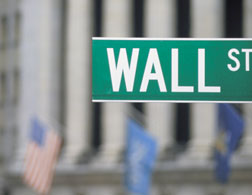Basically, It's OverA parable about how one nation came to financial ruin.
By Charles MungerUpdated Sunday, Feb. 21, 2010, at 3:30 PM ET

In the early 1700s, Europeans discovered in the Pacific Ocean a large, unpopulated island with a temperate climate, rich in all nature's bounty except coal, oil, and natural gas. Reflecting its lack of civilization, they named this island "Basicland."
The Europeans rapidly repopulated Basicland, creating a new nation. They installed a system of government like that of the early United States. There was much encouragement of trade, and no internal tariff or other impediment to such trade. Property rights were greatly respected and strongly enforced. The banking system was simple. It adapted to a national ethos that sought to provide a sound currency, efficient trade, and ample loans for credit-worthy businesses while strongly discouraging loans to the incompetent or for ordinary daily purchases.
Moreover, almost no debt was used to purchase or carry securities or other investments, including real estate and tangible personal property. The one exception was the widespread presence of secured, high-down-payment, fully amortizing, fixed-rate loans on sound houses, other real estate, vehicles, and appliances, to be used by industrious persons who lived within their means. Speculation in Basicland's security and commodity markets was always rigorously discouraged and remained small. There was no trading in options on securities or in derivatives other than "plain vanilla" commodity contracts cleared through responsible exchanges under laws that greatly limited use of financial leverage.
In its first 150 years, the government of Basicland spent no more than 7 percent of its gross domestic product in providing its citizens with essential services such as fire protection, water, sewage and garbage removal, some education, defense forces, courts, and immigration control. A strong family-oriented culture emphasizing duty to relatives, plus considerable private charity, provided the only social safety net.
The tax system was also simple. In the early years, governmental revenues came almost entirely from import duties, and taxes received matched government expenditures. There was never much debt outstanding in the form of government bonds.
As Adam Smith would have expected, GDP per person grew steadily. Indeed, in the modern area it grew in real terms at 3 percent per year, decade after decade, until Basicland led the world in GDP per person. As this happened, taxes on sales, income, property, and payrolls were introduced. Eventually total taxes, matched by total government expenditures, amounted to 35 percent of GDP. The revenue from increased taxes was spent on more government-run education and a substantial government-run social safety net, including medical care and pensions.
A regular increase in such tax-financed government spending, under systems hard to "game" by the unworthy, was considered a moral imperative—a sort of egality-promoting national dividend—so long as growth of such spending was kept well below the growth rate of the country's GDP per person.
Basicland also sought to avoid trouble through a policy that kept imports and exports in near balance, with each amounting to about 25 percent of GDP. Some citizens were initially nervous because 60 percent of imports consisted of absolutely essential coal and oil. But, as the years rolled by with no terrible consequences from this dependency, such worry melted away.
Basicland was exceptionally creditworthy, with no significant deficit ever allowed. And the present value of large "off-book" promises to provide future medical care and pensions appeared unlikely to cause problems, given Basicland's steady 3 percent growth in GDP per person and restraint in making unfunded promises.
Basicland seemed to have a system that would long assure its felicity and long induce other nations to follow its example—thus improving the welfare of all humanity.
But even a country as cautious, sound, and generous as Basicland could come to ruin if it failed to address the dangers that can be caused by the ordinary accidents of life. These dangers were significant by 2012, when the extreme prosperity of Basicland had created a peculiar outcome: As their affluence and leisure time grew, Basicland's citizens more and more whiled away their time in the excitement of casino gambling. Most casino revenue now came from bets on security prices under a system used in the 1920s in the United States and called "the bucket shop system."
The winnings of the casinos eventually amounted to 25 percent of Basicland's GDP, while 22 percent of all employee earnings in Basicland were paid to persons employed by the casinos (many of whom were engineers needed elsewhere). So much time was spent at casinos that it amounted to an average of five hours per day for every citizen of Basicland, including newborn babies and the comatose elderly. Many of the gamblers were highly talented engineers attracted partly by casino poker but mostly by bets available in the bucket shop systems, with the bets now called "financial derivatives."
Many people, particularly foreigners with savings to invest, regarded this situation as disgraceful. After all, they reasoned, it was just common sense for lenders to avoid gambling addicts. As a result, almost all foreigners avoided holding Basicland's currency or owning its bonds. They feared big trouble if the gambling-addicted citizens of Basicland were suddenly faced with hardship.
And then came the twin shocks. Hydrocarbon prices rose to new highs. And in Basicland's export markets there was a dramatic increase in low-cost competition from developing countries. It was soon obvious that the same exports that had formerly amounted to 25 percent of Basicland's GDP would now only amount to 10 percent. Meanwhile, hydrocarbon imports would amount to 30 percent of GDP, instead of 15 percent. Suddenly Basicland had to come up with 30 percent of its GDP every year, in foreign currency, to pay its creditors.
How was Basicland to adjust to this brutal new reality? This problem so stumped Basicland's politicians that they asked for advice from Benfranklin Leekwanyou Vokker, an old man who was considered so virtuous and wise that he was often called the "Good Father." Such consultations were rare. Politicians usually ignored the Good Father because he made no campaign contributions.
Among the suggestions of the Good Father were the following. First, he suggested that Basicland change its laws. It should strongly discourage casino gambling, partly through a complete ban on the trading in financial derivatives, and it should encourage former casino employees—and former casino patrons—to produce and sell items that foreigners were willing to buy. Second, as this change was sure to be painful, he suggested that Basicland's citizens cheerfully embrace their fate. After all, he observed, a man diagnosed with lung cancer is willing to quit smoking and undergo surgery because it is likely to prolong his life.
The views of the Good Father drew some approval, mostly from people who admired the fiscal virtue of the Romans during the Punic Wars. But others, including many of Basicland's prominent economists, had strong objections. These economists had intense faith that any outcome at all in a free market—even wild growth in casino gambling—is constructive. Indeed, these economists were so committed to their basic faith that they looked forward to the day when Basicland would expand real securities trading, as a percentage of securities outstanding, by a factor of 100, so that it could match the speculation level present in the United States just before onslaught of the Great Recession that began in 2008.
The strong faith of these Basicland economists in the beneficence of hypergambling in both securities and financial derivatives stemmed from their utter rejection of the ideas of the great and long-dead economist who had known the most about hyperspeculation, John Maynard Keynes. Keynes had famously said, "When the capital development of a country is the byproduct of the operations of a casino, the job is likely to be ill done." It was easy for these economists to dismiss such a sentence because securities had been so long associated with respectable wealth, and financial derivatives seemed so similar to securities.
Basicland's investment and commercial bankers were hostile to change. Like the objecting economists, the bankers wanted change exactly opposite to change wanted by the Good Father. Such bankers provided constructive services to Basicland. But they had only moderate earnings, which they deeply resented because Basicland's casinos—which provided no such constructive services—reported immoderate earnings from their bucket-shop systems. Moreover, foreign investment bankers had also reported immoderate earnings after building their own bucket-shop systems—and carefully obscuring this fact with ingenious twaddle, including claims that rational risk-management systems were in place, supervised by perfect regulators. Naturally, the ambitious Basicland bankers desired to prosper like the foreign bankers. And so they came to believe that the Good Father lacked any understanding of important and eternal causes of human progress that the bankers were trying to serve by creating more bucket shops in Basicland.
Of course, the most effective political opposition to change came from the gambling casinos themselves. This was not surprising, as at least one casino was located in each legislative district. The casinos resented being compared with cancer when they saw themselves as part of a long-established industry that provided harmless pleasure while improving the thinking skills of its customers.
As it worked out, the politicians ignored the Good Father one more time, and the Basicland banks were allowed to open bucket shops and to finance the purchase and carry of real securities with extreme financial leverage. A couple of economic messes followed, during which every constituency tried to avoid hardship by deflecting it to others. Much counterproductive governmental action was taken, and the country's credit was reduced to tatters. Basicland is now under new management, using a new governmental system. It also has a new nickname: Sorrowland.
Become a fan of Slate on Facebook. Follow us on Twitter.
Мангер описывает становление, расцвет и катастрофу страны Basicland (basic (англ.) — основной, главный), расположенной на большом острове и заселенной европейцами в начале 1700-х гг. Территория с умеренным климатом была богата природными ресурсами за исключением угля, нефти и природного газа. Однако зависимость от поставок углеводородов, на которые приходилось 60% объема ввозимых товаров, не составляла проблемы — страна поддерживала баланс экспорта и импорта, объем которых составлял по 25% ВВП.
С точки зрения сегодняшних проблем экономику Basicland раннего периода можно назвать исключительно здоровой. Банковская система в идеальной стране Мангера была простой. Она соответствовала стремлениям нации обеспечить сильную валюту, эффективную торговлю, достаточный объем ссуд кредитоспособному бизнесу и ограниченный доступ к займам некомпетентных предпринимателей и потребителей. Заемные средства практически не использовались для приобретения ценных бумаг или иных инвестиций, включая недвижимость. Спекуляции с ценными бумагами Basicland и сырьевыми товарами не поощрялись, не было и торговли опционами или иными производными инструментами кроме простых срочных товарных контрактов (plain vanilla).
В первые 150 лет правительство Basicland тратило не больше 7% ВВП на обеспечение граждан необходимыми услугами: защитой от пожаров, водоснабжением, образованием и т. д. Ориентированная на семью культура через поддержку родственников и благотворительность обеспечивала социальную защиту. Экономика страны стабильно росла на 3% в год, пока Basicland не вышла в мировые лидеры по ВВП на душу населения. Когда это произошло, были введены дополнительные налоги, расходы государства достигли 35% ВВП за счет расширения социальных программ — и тенденция роста госрасходов закрепилась.
Картина серьезно изменилась к 2012 г., когда свободное время и деньги привели к существенному уровню вовлеченности граждан в азартные игры. В казино ставки делались, в частности, на цену сырьевых товаров и ценных бумаг. Доходы от работы казино достигли 25% ВВП, а 22% выплаченных в стране зарплат стало приходиться на сотрудников игорных заведений. Кроме того, начались проблемы с внешней торговлей. Резкий рост цен на ввозимое сырье на фоне снижения рынка сбыта экспортной продукции из-за конкуренции со странами, где производство обходится дешевле, привели к перекосу баланса. Иностранные инвесторы начали отказываться от валюты и долговых бумаг Basicland, не желая делать ставку на исход азартных игр.
Избежать краха мог помочь совет мудрого старика по прозвищу Хороший Отец, призвавшего ограничить работу казино и заняться производством востребованных на мировом рынке товаров. Но политики имели привычку в большей степени прислушиваться к словам тех, кто делал вклады в их избирательные фонды. Индустрия азартных игр распространила свое влияние по всей стране и во властные коридоры, а основной вклад внесла убежденность большинства в эффективности рынка, свободного от вмешательства. Все это привело к краху экономики, смене политической системы, да и страна теперь известна под названием Sorrowland (sorrow (англ.) — печаль, горе).














Статус: |
Группа: Гости
публикаций 0
комментариев 0
Рейтинг поста:
wall =
- защита
- каменный вал
- фундамент
существительное- бок
- стена
- барьер
- преграда
- стенка
- вал
- укрепления
глагол- обносить стеной
- укреплять
- строить укрепления
- разделять стеной
прилагательноеwalls = Стены (и - больше ни каких значений....)
walls t = Стены T
wall st = Wall St